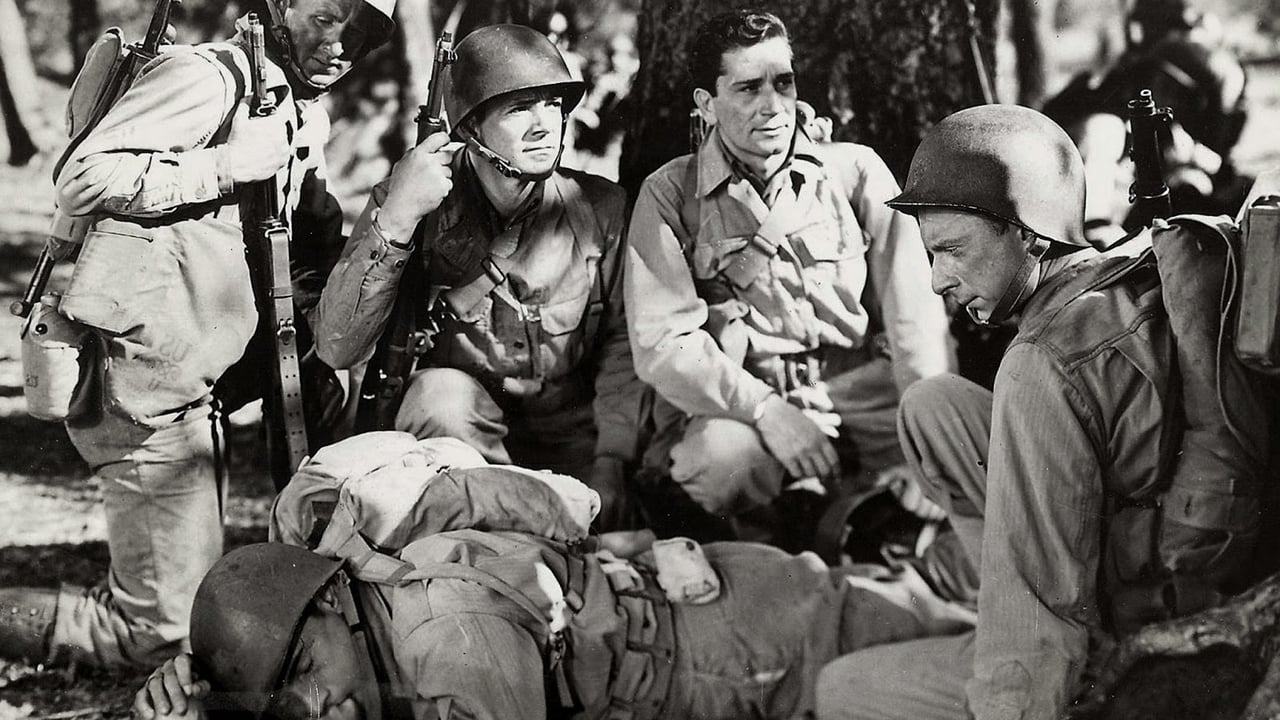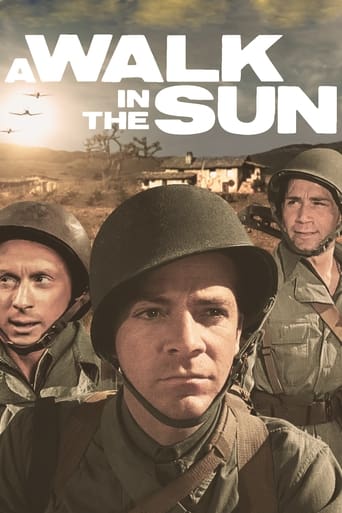

If IMDb is to be believed this movie was released in December, 1945, some seven or eight months after the War In Europe ended so that in one way any anti-war message built into it was superfluous. Director Lewis Milestone who was, in fact, a fine all-rounder with a long career, will always be closely associated with All Quiet On The Western Front which dealt with the futility of war albeit World War One so it was perhaps natural that he repeat the lesson with World War Two. This movie is notable for its matter of fact acceptance of war as a natural recurring phenomena and one that makes little or no attempt to either glamorize war or paint a horrific picture of it. The main thrust is the six-mile trek by one platoon from a beachhead in Salerno inland to the farmhouse that they have been assigned to take and hold. En route we meet and get to know the typical Hollywood 'bomber crew' cross section of personnel with very little actual combat until the last couple of reels when they do, in fact, attain their objective. Certainly worth a look.
... View MoreA Walk in the Sun (1945)The first third of this film is amazing. It' remarkably disturbing and dark, about a bunch of soldiers landing at night in Italy, World War II. The sun does eventually rise, but it's an eerie and claustrophobic and surprisingly gentle twenty minutes. The cast is really perfect, without any overly macho guys, just some ordinary men with feelings, feelings for life, for each other little by little, and for a kind of fatalistic fear that turns into acceptance at times, until events force them into action.Once toward halfway, the movie becomes a more conventional, a large rambling group of foot soldiers a bit lost as to what to do as they walk along, in the sun, in Italy. They talk without a lot of open fear, including a bit of chitchat even as they confront enemies of one kind or another. There is an air of ordinary resignation through it all, as if the movie makers knew the audience could only handle a kid gloves kind of truth about the war, which was still raging when it was released. Even though there is an inevitable sense that the Americans were winning (they were landing in Italy, not being pushed off to sea), there is also the sense that these really nice guys might die, suddenly, because of events beyond their control.By the final third a military objective clarifies, a small one, but a potentially deadly one. When it plays out, it's more about war, and winning. The enemy is never shown, and the brutality is limited to the last two minutes, but it's a devastating two minutes, and probably too difficult for audiences to watch at the time while the war was going on. Though filming was finished in January 1945, the film wasn't released officially until December, with six months of peace already healing some of the wounds, and didn't see wide release until the following year, long after war films had stopped being made. Director Milestone did get Army approval for the film in 1945, and it does seem accurate in its awfulness, even now. It's right before the climax that the film returns to it extraordinary, inner conscience, following Dana Andrews crawling though the weeds to the farmhouse they intend to overtake. How long would it take to crawl around the world? A hundred years? A thousand years?For the best this film has, it's essential, a major piece of war filmmaking.
... View MoreThis is a WWII film, made during the war, and therefore should be closer to the truth than later films.We get attempts at character, and some of the banter is well done.We get some situations that are well done, such as the confusion, of not knowing what is going on somewhere else, which two characters experience early in a trench, and which brings too much curiosity out in one of the characters.We have a realistic depiction of a breakdown.There, the assets of the film stop. Unfortunately, we get the heavy handed cigarette commercial, and we know tobacco companies sponsor this film since any character who doesn't light up a cigarette is destined to become a casualty. The predictability doesn't end there. The film goes beyond being a bit contrived into the "here we go again" clichés.The clichés ruin this film. For a film that tries to pride itself on realism, there is an incredible lack of screaming after being shot, and of the cleanest wounds ever in film. That would be passable, except that immediately after a man is shot, the camera follows him for many seconds of "taking the pain" quietly, and we never even see any pain on these men. Now, some directors go overboard on the "pain" deal, and they are just as stereotypical, but this film is ridiculous in the other direction.We know from the contrived writing which characters bullets will find, and which they won't.And the stupid song that went with it brings the rating down considerably.Most war films from this era were very good in one way or another. This one falls well short of them.
... View MoreConsidering the fact that this movie was made so closely to end of WW2, it is a little surprising that it wasn't more of a patriotic effort. In some ways you could consider it ahead of it's time. The characters have flaws, there is a reference to battle fatigue, and heroes die.To be sure, the clichés abound, but they lay them out early in the introduction. A couple of wise guys from Brooklyn (and Jersey City), the yokel, the farmer, the poet, etc. But to their credit, they cast believable actors in the relevant parts. Interestingly, they cast Richard Conte as a wisecracking gunner, and Norman Lloyd as a scout. Both were Jersey City natives and added an air of authenticity to the production. I lived in Jersey City for a while and I can tell you that I could have met these guys at any gin mill in Journal Square and wouldn't have been surprised. Most of the rest of the cast was just as authentic.To be sure, there are problems with the script, but most of them had to do with the constrictions of the times. "Hoist tail". Get it? "The loving army, the loving food, the loving etc". What do you want for 1945? Maybe it was even a little provocative for the times.This movie was part of a transition from the standard WW2 propaganda efforts like Sands of Iwo Jima, Bataan, etc, to a more rational presentation of the horror of war. We hadn't yet progressed to the anti-war era of Platoon or Apocalypse Now, but we were getting there. Realism was creeping into the script.I recommend this movie for it's originality, but be prepared for the routine - just don't let it ruin the movie for you.
... View More